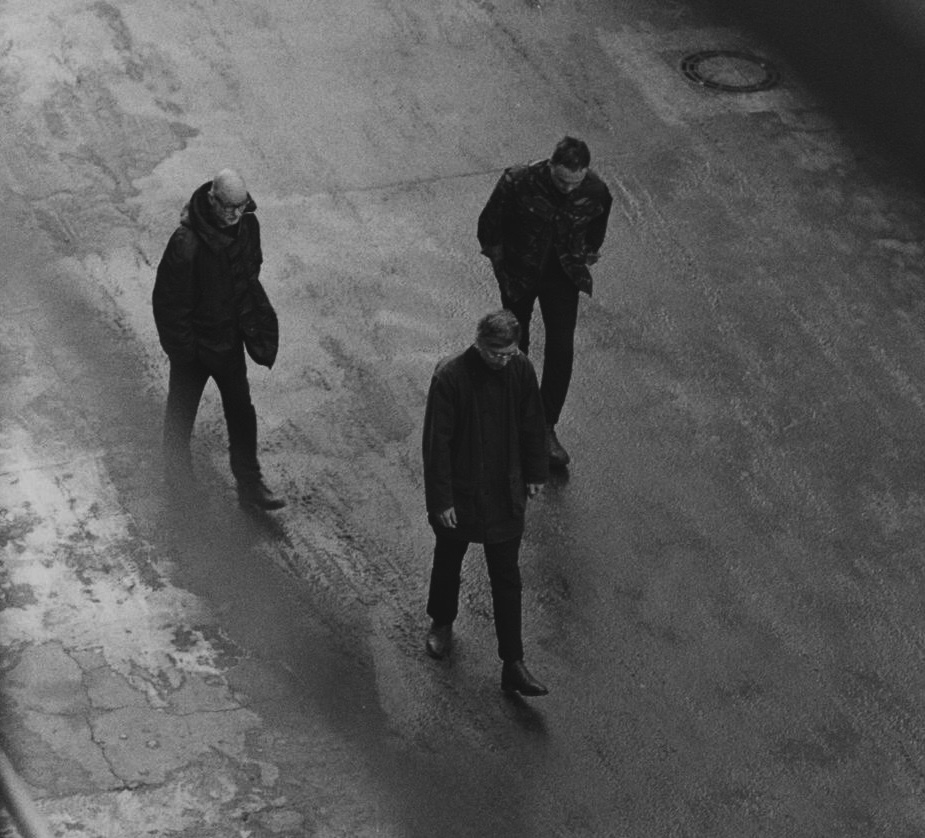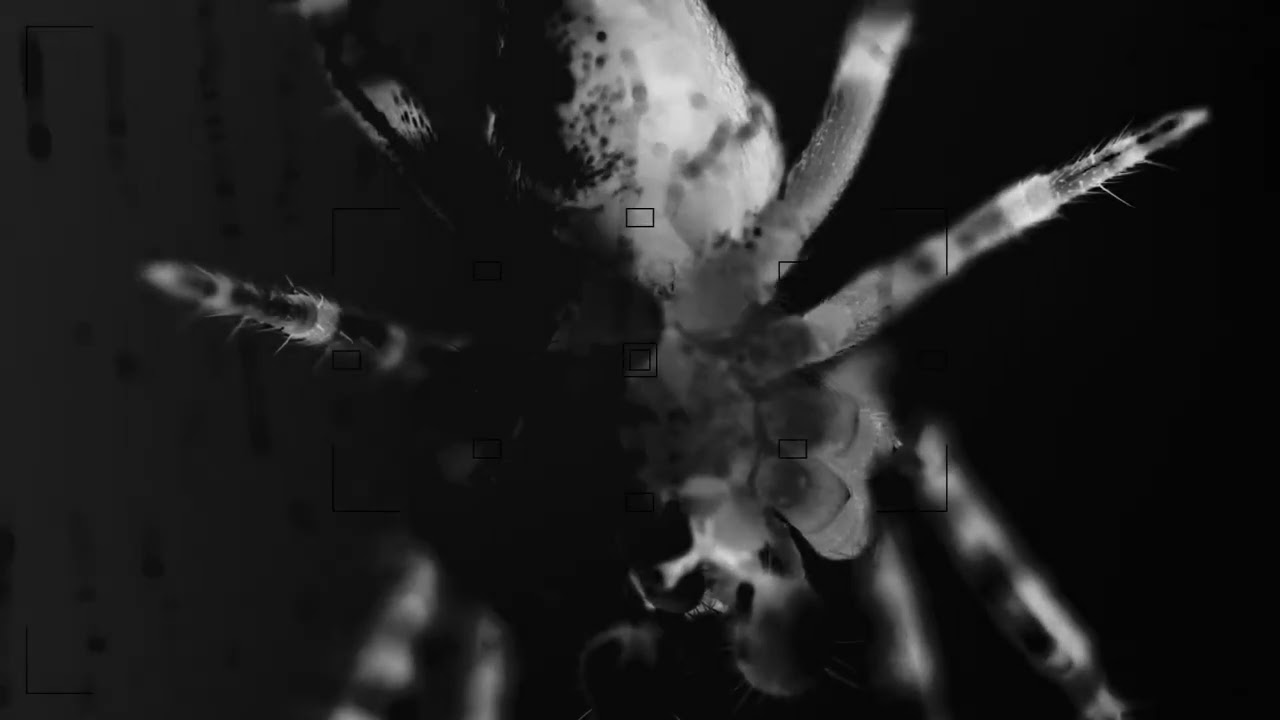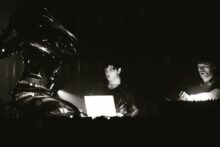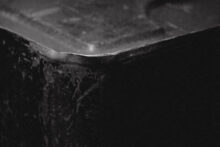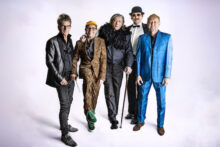“The whole thing was like, I don’t know how to say it in English, like it ran by itself, you know – it was super automatic,” says Boris Wilsdorf about recording Anglo-Irish-Aussie-German three-way power trio Eros, “what is it in German? Ein Selbstläufer, a ‘self-runner’.” Wilsdorf is a Berlin-born music producer who learned his chops working at the city’s Hansa Studios before developing an ongoing creative relationship with Einstürzende Neubauten – he was on the desk for this year’s stunning Rampen – Alien Pop Music album. Sat on Zoom in front of a flaming stove in his Berlin apartment, Wilsdorf is joined by Karl ‘Regis’ O’Connor (in a Munich hotel room, travelling to and from the techno coalface) and Liam Andrews of MY DISCO (currently in Greece after touring with Big Brave) to discuss the recording of Eros’ debut album, Your Truth Is A Lie.
The album is eight tracks of deep bass thrum, dense and crackling rhythms, murky interchanging vocals, and more judicious use of vacant sonic space than a Russian oligarch with a large London property portfolio. It’s full of moments where you might expect the music to collapse like those concrete and glass investments disintegrating in some post-apocalyptic future, but instead, the focus is on pulling back from the brink to ratchet up the tension. Out of any record released this year, it’s an astonishingly tactile listen. You can hear the austere power of MY DISCO, the heavy and unruly energy of Regis, the space for vibration that always comes with Einstürzende Neubauten, but this is an album far greater than this sum of parts. This, in a large part, comes from the place in which is was recorded, Wilsdorf’s andereBaustelle studio in Wedding area of Berlin. “Boris’ studio has got a real mad energy,” says O’Connor, “you’re very aware of what’s been recorded in there. I personally found it quite intimidating to even go into that studio – all the Neubauten stuff was set up as they were rehearsing. I thought working with people like Boris was unattainable, but Liam was very fearless about it.”
Andrews had got in touch with Boris in 2018 to sound him out about the prospect of working with MY DISCO on music that would become their Environment album, released on O’Connor’s Downwards label the following year. “Meeting people like Boris or [Steve] Albini or other people I’ve worked with in the past, it’s always very intimidating,” Andrews says, “You don’t know their personalities truly until you arrive, and in a working relationship, too. But once I become interested in someone’s sound and what they can encapsulate and translate, the obsession begins. And it doesn’t take much – it really is just sending an email. So, the initial step is not intimidating – it’s from behind closed doors. I’ve been lucky in the past that people have been so accepting to take on projects I’m working on.” Andrews describes the process of working with Wilsdorf at andereBaustelle as “beautiful”.
A little while later, O’Connor asked him to play bass on some Regis tracks, and Andrews suggested they try recording in Wilsdorf’s studio. It didn’t take long for the trio to realise there was far more potential, as the producer explains: “Liam was playing bass and I was putting some effects on and put it through the tank, and Karl got more and more excited – ‘yeah, yeah! Do that to my drums too!’ And that’s how we got it.” O’Connor continues: “it became very evident that this was something that we were all enjoying a lot. It wasn’t just a Regis thing. It was something that was very collaborative. Boris just sat back in his chair and said, ‘well, we really should do this as a band’”. The first fruits came in the form of debut EP A Southern Code, released in 2022. It was such a pleasurable process to make that O’Connor, Wilsdorf and Andrews decided to return to the studio to record new material, as well as reworking some of its tracks – not by adding to them, but instead honing them by taking elements away.
For Wilsdorf, it sounds like it was a joy having O’Connor and Andrews in a studio he is clearly intensely attached to, and that feels like a part of himself. “I feel really at home there now,” he says, “when I switch off the lights in the evening, it’s like, ah, this is my place. I like that.” He praises the other two for being able to “click” and fit so seamlessly together, especially Andrews’ playing: “he just goes in there and, boom, puts the bass on there and it’s top-notch from the first moment”. The praise is returned, and both Andrew and O’Connor describe their awe at watching Boris live mix, running sounds around his desk and through the “Black Tank” (a large old water tank that acts as both reverb unit and percussion), describing it as like watching a dub producer in action. The Black Tank “is kind of a signature, it’s all over the record, on almost every bass drum” says Wilsdorf; “We tried to make songs with no tank, and we didn’t succeed.”
Aided by the mysterious power of the Black Tank, the initial sessions proceeded quickly. “We didn’t spend that much time in the studio,” Wilsdorf explains, “We met for three days, but those days were always so productive – it’s Selbstläufer, again, you know, the self-runner. We didn’t have long sessions over weeks where we fiddled around. It was, like, boom, right there. We developed it in the studio and that’s the way it should be, but these days it is a luxury. All these effects I can only do while somebody’s performing in the studio, the inspiration is only there when there’s somebody performing I could never do it afterwards, you know? People have headphones on and then hear the madness, and then they play differently, they play with the effects.”
When O’Connor and Andrews departed, they “left me with all these crazy recordings, and then I was able to sit there in peace and put the pieces together. It was super nice. I tried to make songs out of it in the end, you know,” says Wilsdorf with a chuckle, “it was a little bit my influence, it’s like being the most conservative guy of us three, you know, to make it a bit mainstream at least.” Andrews credits Wilsdorf for the introduction of structure to the pieces of music. “There’s a lot of rhythms and textures that Karl and I were bringing – Boris, you very much structured these into some cohesion.” O’Connor says that this structure is thanks to Boris’ open-minded nature. “He’s a proper, real producer where he makes complete magic happen. He doesn’t control anything – it’s very experimental, but not for the sake of being experimental, because that’s just the way that we all approach music anyway. You can’t use computers to replicate the sound that you get in a proper studio, and certainly not in Boris’s studio, which has a very unique sound. Then you’ve got him on top of that, which is a really powerful weapon.”
There seems to have been a refreshing removal of ego in the safe space provided by Wilsdorf. “Liam’s the front man. I’m a solo performer, so I guess by default that’s the front man, and Boris really is as well,” says O’Connor, “we’ve all got our own distinct personalities in the way we make music and are very single-minded. These things that could be fractious in the studio under normal circumstances, but it wasn’t. I was really happy the way that we navigated that, and we did it very easily.” It’s even as if O’Connor sees himself as the subservient partner in the trio: “I certainly listen to Boris and Liam on pretty much everything, because you have to surrender certain things in the studio.”
Furthermore, given O’Connor’s predilection for a fruity quote about what he really thinks of the techno world, or the yelling and theatrics that often accompanies his performances with Anthony Child as half of British Murder Boys, Eros could have gone very wrong as a sort of industrial techno midlife crisis. “I’m very aware of what not to do, other people have failed, stepping over from one thing to the next – ‘there’s this guy who does techno, and all of a sudden he’s doing that’,” O’Connor says, “but I’m not playing at it. It’s completely authentic, because it’s what I’ve always done. I want it to be very fluid, the way that it went from one to the other, and with Boris and Liam now, it’s made it real.” Andrews agrees, saying that “The way Karl and Boris approach music and their influence on me – and maybe vice versa – and also MY DISCO working with Regis and then making a record as MY DISCO with Boris, it all kind of felt very fluid to transition into making music with them. It felt very open and very free.” And, as Wilsdorf adds, “we just had a big laugh. We had so much fun.”
Perhaps the sonic heaviness of Your Truth Is A Lie is never overbearing precisely because of the pleasure that went into its making. “It brings a lot to us personally on a creative level. We’re all thriving off at the moment and just want to attach ourselves to that,” says Andrews. The trio are already working out how to take the Eros project on the road and are planning to go back into andereBaustelle next year to see what further magic Wilsdorf can conjure from them within its walls and out of the Black Tank. “When you’re in that environment, and you know the music that’s been recorded there, you have to step up to it,” says O’Connor. For these three selbstläufers, the race has only just begun.
Your Truth Is A Lie is released on 1 November 2024 via Downwards

